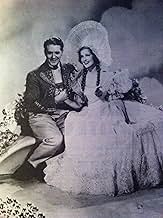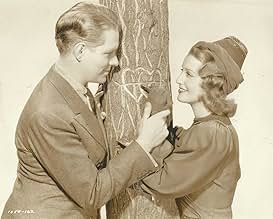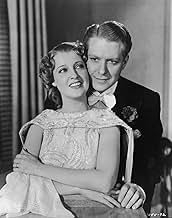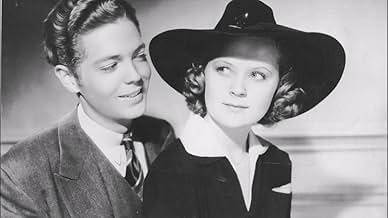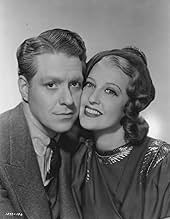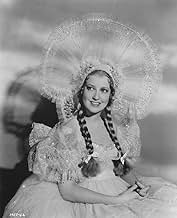VALUTAZIONE IMDb
6,2/10
767
LA TUA VALUTAZIONE
Aggiungi una trama nella tua linguaThe team behind a successful Broadway production tries to stop the married stars from transitioning to Hollywood.The team behind a successful Broadway production tries to stop the married stars from transitioning to Hollywood.The team behind a successful Broadway production tries to stop the married stars from transitioning to Hollywood.
- Regia
- Sceneggiatura
- Star
- Candidato a 2 Oscar
- 5 vittorie e 2 candidature totali
Recensioni in evidenza
"Sweethearts" has so much going for it that it's painful to admit to some lesser Victor Herbert songs as main features. Eddy and MacDonald are fine, the Technicolor is lovely, and the cast is top notch. Unfortunately, there are only about two songs that are worthy of the great Herbert.
Well, every composer can't turn out all hits; it's just unfortunate that the lesser songs are given such up front treatment. As much as the stars pour their all into these songs, they fall rather flat and unmemorable.
The production numbers are spectacular, the production design lovely, and the costumes eye-popping. Too bad this one didn't rise to the level of the duo's other film entries. Still, kudos to the quality of both the singing and acting of Eddy-MacDonald.
Well, every composer can't turn out all hits; it's just unfortunate that the lesser songs are given such up front treatment. As much as the stars pour their all into these songs, they fall rather flat and unmemorable.
The production numbers are spectacular, the production design lovely, and the costumes eye-popping. Too bad this one didn't rise to the level of the duo's other film entries. Still, kudos to the quality of both the singing and acting of Eddy-MacDonald.
While there films are not nearly so popular today, Jeanette MacDonald and Nelson Eddy were incredibly hot properties for MGM and this would explain why MGM made "Sweethearts" in full Technicolor...something they'd never done with a full length film. Many studios had made films using cheaper (and inferior) color stock such as Two-Color Technicolor and the new, improved full color from Technicolor was expensive and MGM pulled out all the stops for their big team.
MacDonald and Eddy play Gwen Marlowe and Ernest Lane, a pair of Broadway stars who have been packing theaters for years with their latest show, "Sweethearts". Not surprisingly, Hollywood comes knocking...and Marlowe and Lane's handlers do their best to try to hold on to them and prevent their defection to the West Coast.
As you watch this, you might think that the Technicolor is a bit garish and intense. This was often the case with early Technicolor...partly because of the film process and partly because its inventor insisted that his ex-wife, Natalie Kalmus, be the color consultant...and she determined the colors of the costumes, sets and the like. And, of the stars, MacDonald comes off the worst because she appears so incredibly ruddy in the film....and rather unnatural.
As you'd expect in one of their films, there is a LOT of singing...intense singing and big stage production numbers. This is the style of their films...a style which seemed to grow less and less popular into the 1940s and 50s. You either like it or you don't. As for the rest of the story, it's enjoyable and well made. I didn't mind the story at first, but found it really tanked when MacDonald's character changed...becoming rather demanding and nasty and VERY jealous. This was NOT a welcome story element. I also found the musical numbers difficult to enjoy because it's a style I've never been all that fond of seeing and hearing in films.
MacDonald and Eddy play Gwen Marlowe and Ernest Lane, a pair of Broadway stars who have been packing theaters for years with their latest show, "Sweethearts". Not surprisingly, Hollywood comes knocking...and Marlowe and Lane's handlers do their best to try to hold on to them and prevent their defection to the West Coast.
As you watch this, you might think that the Technicolor is a bit garish and intense. This was often the case with early Technicolor...partly because of the film process and partly because its inventor insisted that his ex-wife, Natalie Kalmus, be the color consultant...and she determined the colors of the costumes, sets and the like. And, of the stars, MacDonald comes off the worst because she appears so incredibly ruddy in the film....and rather unnatural.
As you'd expect in one of their films, there is a LOT of singing...intense singing and big stage production numbers. This is the style of their films...a style which seemed to grow less and less popular into the 1940s and 50s. You either like it or you don't. As for the rest of the story, it's enjoyable and well made. I didn't mind the story at first, but found it really tanked when MacDonald's character changed...becoming rather demanding and nasty and VERY jealous. This was NOT a welcome story element. I also found the musical numbers difficult to enjoy because it's a style I've never been all that fond of seeing and hearing in films.
A high-budget offering for MGM stars Nelson Eddy and Jeanette Macdonald, and the studio's first film to be released in Technicolor (Maytime had been started but not completed in this process), centres on a lovey-dovey couple who have worked for years in a Broadway success and are offered the chance to work in Hollywood. How do their theatre collaborators stop them going there?
Unusually for films featuring the Singing Sweethearts, this one has a sparky and funny script (largely by Dorothy Parker and Alan Campbell) from which it benefits. Not many songs have survived from the Broadway production of the real 'Sweethearts' (sadly, the omissions include 'The Cricket on the Hearth', which was really quite a sweet song), and others have been added to flesh out the Hollywood fantasy. Perhaps the best numbers are 'Pretty as a Picture' and 'On Parade'.
In support are Frank Morgan ('the Wizard of Oz'), Ray Bolger (not used anywhere near enough), and the poor man's Eddy and Macdonald, Douglas MacPhail and Betty Jaynes, who suffer from a total lack of charisma. The leads themselves are fine and do with the more meaty than usual material. Perhaps their more slushy collaborations such as 'Rose Marie' and 'Maytime' are better overall, but 'Sweethearts' is definitely worth a look.
Unusually for films featuring the Singing Sweethearts, this one has a sparky and funny script (largely by Dorothy Parker and Alan Campbell) from which it benefits. Not many songs have survived from the Broadway production of the real 'Sweethearts' (sadly, the omissions include 'The Cricket on the Hearth', which was really quite a sweet song), and others have been added to flesh out the Hollywood fantasy. Perhaps the best numbers are 'Pretty as a Picture' and 'On Parade'.
In support are Frank Morgan ('the Wizard of Oz'), Ray Bolger (not used anywhere near enough), and the poor man's Eddy and Macdonald, Douglas MacPhail and Betty Jaynes, who suffer from a total lack of charisma. The leads themselves are fine and do with the more meaty than usual material. Perhaps their more slushy collaborations such as 'Rose Marie' and 'Maytime' are better overall, but 'Sweethearts' is definitely worth a look.
In glorious Technicolor,the stars are probably at their best,exceeding such romances as "New Moon","Rose Marie" and the others. Production values are enormous,beginning with a dance by Ray Bolger to a Dutch background heightened in color by beds of tulips.They are just enough not to be overwhelming. Jean and Nelson are the stars in the film of the sixth year of the stage production of Victor Herbert's 1913 show "Sweethearts" and are being done to death by the importunities of radio,recording,and family demands. Frank Morgan is his usual perplexed and harassed self as the stage producer,Herman Bing and Misha Auer are in top form as a mutually fighting conductor and wannabe playwright. One delightful vignette is during her modelling session at a dressmaker's shop,where she shows off the various colors and styles for different occasions. One gem is Eddy's race,pursued by speed cops,in a taxi from recording studio to NBC radio (looking much then as now) where Jeanette awaits him,having just broadcast Herbert's "Badinage" ably accompanied with much panache by Dalies Frantz.Some of her old Lubitsch (Director "Merry Widow"et al.) sassiness comes out as she mimes with the audience, until Eddy arrives, looking like a naughty schoolboy,with sleeve pulled up arm' amid her tidying of his appearance. One of the nicest shots is down the staircase at their home during the duet of "Little Gray home in the West",one of the most sincere performances. Herbert Stothart deserves much credit for his arrangement of Herbert's melodies,the duets and the delightful continuous orchestrations of the sound track. I would certainly watch this masterpiece several times.
MGM spared no expense in dressing up the sets and costumes for an opulent technicolor musical starring America's singing sweethearts, Jeanette MacDonald and Nelson Eddy. They even included a witty script by Dorothy Parker, songs by Victor Herbert and a supporting cast that included Frank Morgan, Ray Bolger, Reginald Gardiner and Allyn Joslyn. But changing tastes have made this one questionable material for today's audiences.
This time the stars are not in period costumes. The story is a contemporary one about two stage stars tired of appearing for the sixth straight year on Broadway in a musical called "Sweethearts" who decide to give Hollywood a try. Plot complications occur when blustery Frank Morgan uses trickery to make Jeanette believe Nelson is cheating on her. Everything is straightened out for a happy ending that reunites the two stars and has them both returning to the Broadway scene where their hearts truly lie.
Fans of the famous duo will undoubtedly enjoy this one, but today's movie fans are likely to be put off by much of the humor. Acting styles and singing tastes have changed drastically since 1938. The stars are in fine voice but the songs are not among Herbert's best and, while there are a few amusing moments, the film has a very dated quality both in story and acting that makes it sometimes seem like an unpleasant pill to swallow.
This is true even though both stars are photographed to advantage and are still at their physical peak here--but as a musical, despite the technicolor trimmings, it falls short of being a real winner.
This time the stars are not in period costumes. The story is a contemporary one about two stage stars tired of appearing for the sixth straight year on Broadway in a musical called "Sweethearts" who decide to give Hollywood a try. Plot complications occur when blustery Frank Morgan uses trickery to make Jeanette believe Nelson is cheating on her. Everything is straightened out for a happy ending that reunites the two stars and has them both returning to the Broadway scene where their hearts truly lie.
Fans of the famous duo will undoubtedly enjoy this one, but today's movie fans are likely to be put off by much of the humor. Acting styles and singing tastes have changed drastically since 1938. The stars are in fine voice but the songs are not among Herbert's best and, while there are a few amusing moments, the film has a very dated quality both in story and acting that makes it sometimes seem like an unpleasant pill to swallow.
This is true even though both stars are photographed to advantage and are still at their physical peak here--but as a musical, despite the technicolor trimmings, it falls short of being a real winner.
Lo sapevi?
- QuizThis is MGM's first full-length film to feature a different lion roaring in the logo, by the name of Tanner. He appeared at the beginning of MGM's Technicolor feature films and cartoons from 1936 to 1956 and later, from 1963 to 1967.
- Citazioni
Felix Lehman: [Counting on Gwen and Ernest's gullibility] I'm an old man and I don't get many pleasures, but you go ahead. Just think about yourselves. Forget about me.
- Curiosità sui creditiA written epilogue explains: "In our screen play, certain dramatic liberties have been taken with the operetta 'SWEETHEARTS'. We depict the scenes from the operetta as though it was a recent production presented by a wholly fictitious producer Felix Lehman and composed and written by two wholly imaginary persons Oscar Engel and Leo Kronk whereas the stage operetta 'SWEETHEARTS' was actually written and produced on the stage about 1913, Victor Herbert composing the music and Frédérique De Grésac (as Fred de Gresac), Robert B. Smith and Harry B. Smith writing the book and lyrics."
- ConnessioniFeatured in Nelson and Jeanette (1993)
- Colonne sonoreSweethearts
(1938) (uncredited)
Music by Victor Herbert (1913)
Lyrics by Bob Wright and Chet Forrest
Played during the opening credits and often in the score
Performed by Jeanette MacDonald and Nelson Eddy
Reprised by them for a radio broadcast with chorus
Later sung by MacDonald with Douglas McPhail and Eddy with Betty Jaynes
I più visti
Accedi per valutare e creare un elenco di titoli salvati per ottenere consigli personalizzati
Dettagli
- Data di uscita
- Paese di origine
- Lingua
- Celebre anche come
- Sweethearts
- Luoghi delle riprese
- Azienda produttrice
- Vedi altri crediti dell’azienda su IMDbPro
- Tempo di esecuzione1 ora 54 minuti
- Colore
- Proporzioni
- 1.37 : 1
Contribuisci a questa pagina
Suggerisci una modifica o aggiungi i contenuti mancanti

Divario superiore
By what name was Bisticci d'amore (1938) officially released in India in English?
Rispondi
